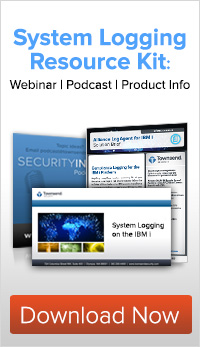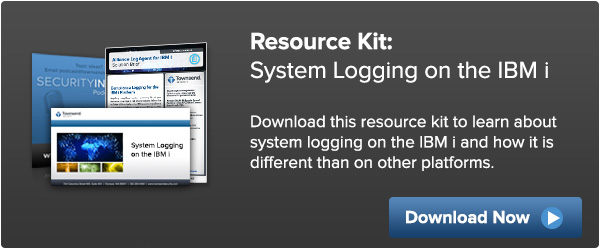Q: How does LogAgent send security information to my SIEM or log collection server? Is information batched or real time?
 The Townsend Security solution for system logging and SIEM integration is Alliance LogAgent. It works with a large number of SIEM solutions including IBM QRadar, LogRhythm, Dell SecureWorks, NTT/Solutionary, Splunk, Alert Logic, HP ArcSight, McAfee, and many others. It brings the IBM i (iSeries, AS/400) into an active monitoring strategy that is so important to good security. Since real-time security event collection is crucial to active monitoring, customers often ask us how Alliance LogAgent achieves this? Let’s take a deeper dive into how this is accomplished.
The Townsend Security solution for system logging and SIEM integration is Alliance LogAgent. It works with a large number of SIEM solutions including IBM QRadar, LogRhythm, Dell SecureWorks, NTT/Solutionary, Splunk, Alert Logic, HP ArcSight, McAfee, and many others. It brings the IBM i (iSeries, AS/400) into an active monitoring strategy that is so important to good security. Since real-time security event collection is crucial to active monitoring, customers often ask us how Alliance LogAgent achieves this? Let’s take a deeper dive into how this is accomplished.
The IBM security audit journal is named QAUDJRN and it collects most of the critical security events on the IBM i platform. Unlike many IBM i system logging tools, Alliance LogAgent collects events from this journal in real time. Using IBM provided application program interfaces (APIs), events are collected from the security journal as they are written to the journal by the operating system. There is no batch-oriented extraction of events once or twice a day, and no batch transfer using unsecure FTP. Alliance LogAgent is able to grab the events as they become available. This provides the real-time view of security events that is so critical to active monitoring, correlation and alerting by SIEM solutions.
Once the event is extracted it has to be converted into a usable format. The security event information in QAUDJRN is in an internal IBM format and is stored in the EBCDIC character set which is largely unusable by SIEM solutions. Alliance LogAgent immediately converts the important information into a system log format (syslog, Common Event Format, or Log Event Extended Format), and translates it to the ASCII character set that is used by SIEM solutions. To make the information usable to SIEM solutions the event information is normalized into fields that are easy for SIEM solutions to understand. These normalized fields are in the keyword=value format (more on this is another blog). The formatting also happens in real time so that there are no delays imposed by the conversion process.
Once the security event is extracted and converted to a usable format, it must be communicated to the SIEM solution for processing. Alliance LogAgent implements a set of syslog communications modules that immediately send the security event to the SIEM server. Alliance LogAgent supports three different syslog communications options:
- Internet UDP protocol
- Internet TCP protocol
- Internet TLS encrypted TCP protocol
By default these communications programs send security events to the standard syslog port of 514 on the SIEM server, but you can easily change the port number if needed. Not every SIEM solution supports encrypted transfer of log events, but Alliance LogAgent gives you this option along with non-encrypted options for log transfer.
Alliance LogAgent runs in a background batch process at a low priority so that it does not disrupt normal interactive response times. Using the optimized processes of Alliance LogAgent the IBM i customer achieves real-time processing of security events and gets the best results and maximum benefit from their SIEM solution. Security issues are identified immediately and the IBM i system administrator can react swiftly to potential security breaches.
Additionally, Alliance LogAgent takes a similar approach to monitoring other security event sources on the IBM i platform. The QHST system message facility is also monitored in near real-time as messages are logged to the QHST files. For messages sent to the system operator message queue QSYSOPR or QSYSMSG, Alliance LogAgent also monitors these message queues for events and sends the information to the SIEM server in real time. The same is also true of the Alliance LogAgent exit point monitoring applications.
Alliance LogAgent was built from the ground up to accommodate real-time security event collection and transmission to your SIEM solution. It is fast, efficient, and non-intrusive. Exactly what you need to collect and monitor security information on your IBM i platform.

